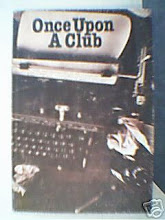insidetheclub
Let’s ‘kill’ journalists
By Roy G. Acosta
The title of this piece was not my idea; it was Joe Burgos Jr.’s, an Ilokano from Ilocos
But even if he really has murder in his mind for his wayward colleagues, I wouldn’t blame him. I know for a fact that many in our profession who are now sick of the state of Philippine media today feel the same way.
Let’s start with the radio and television news. The fun begins when the newsreaders start “shouting” the news – some in rapid-fire fashion, some with a voice so shrill, one of them, in fact, once broke the wine glass I was holding – and some tumbling all over the place with tongue twisters but somehow still managing to modulate. And then there is one who literally lives up to his name. He is so shallow that when you wade through his thoughts in his morning TV show, you won’t even get your feet wet. Thank God for cable TV. At least, when we get tired of laughing ourselves silly after hearing our local newsreader-clowns, we could switch to BBC or CNN or Fox News, among other news agencies, where sober news is read soberly by sober newscasters who conduct sober and intelligent interviews. Come to think of it, this is probably why this country is going to the dogs. Everybody is shouting. Singers shout their songs. Labor leaders, legislators, Malacanang officials, hangers-on and hangers-on of the hangers-on shout themselves hoarse at the slightest provocation. Nobody listens anymore. Everyone wants to hear only his own voice.

The English news items are no better. That’s why you often hear phrases like “first year anniversary” or “cartographic sketch of the suspect” or “Sunset is at
The “anni” in anniversary comes from the Latin “annum” or year. That’s why “first year anniversary” is a redundancy. It’s first anniversary. A cartographer is a map makers; his product is a cartograph, most commonly known as a map. The “drawing” that is often released by the National Bureau of Investigation or police investigators who are pursuing a suspect in a crime is simply called a sketch. “Sunset at
“At this point in time” is as execrable as “A pleasant good morning to you.” What is pleasant – the good morning or the morning?
The verb “bless” is transitive (vt in your dictionary) and therefore, needs an object. So it should be “God bless you,” if you mean your listener. The verb “assure” is also “vt.” So one does not say, “President Arroyo assured that she will be a good President from now on.” One says, “President Arroyo assured the people she will be a good President from now on.” But that’s for the people to believe, of course.
Kidding aside, are radio and television. Have you noticed that when there is a tragedy – fire hits a squatter area leaving hundreds homeless, people are killed during a neighborhood rumble, a landslide buries an entire family, etc. – the first question invariably asked by a radio or television reporter interviewing the people affected is: “How do you feel about what has happened?” Good God!
Or the news reporters who cannot resist injecting their own @#$^%&* (read that stupid – that’s the kindest translation we can make) opinions in their reports.
When some newsreaders and so-called commentators left media to join the political circus, many, I’m sure, heaved a sigh of relief. After all, most of their news analysis always seems to come from that part of the anatomy for which such pieces are named.
But the relief has been short-lived. They’re back. Only this time, many of them are now defending the very institution they had been mercilessly blasting. Talk about truth being the ultimate goal of journalism. You know who they are!
Our colleagues in the print medium are no better.
The parade of shaming Filipinisms could make your skin crawl – “lady drug pusher,” “tuition fee,” “”toll fee,” “payroll money,” “ransom money,” and so on. Even “carnapper,” “fiscalizer” and “owner-type jeep” should be banished from the Filipino lexicon; they don’t exist anywhere.
Reading some of our newspapers every day invariably reminds me of what a college long gone to God’s heaven that many editors have a running feud with the English language. Or Pilipino, for that matter.
And we are not talking about the contents of their papers.
As I said at the beginning of this piece, many of us in media may indeed be justified in wanting to kill wayward colleagues who are giving the profession nothing but shame. In fact, the way things are going, Joe Burgos may finally get to convince me; it’s beginning to hurt when I laugh, especially when we start talking about corruption in media. But in the meantime, I’d rather that the present state of the media in our country be allowed to continue. That our media men, especially the so-called “broadcast journalists” be allowed to continue casting their broad net of stupidity and corruption until such time that the people themselves realize their icons are really not as special breed of people but are, in fact, just like those in other professions – the soldiers, policemen and politicians, who, incidentally, are media’s favorite whipping boys.
When the time comes, Joe, you won’t have to kill journalists; maybe the people – whom they have idiotized and fooled all along – will do the dirty, if extremely necessary, job. Or perhaps, in an unprecedented attack of conscience, our “journalists” will kill themselves – in shame. And we hope that from their ashes – we will burn them to reduce the risk of contamination- will rise a better breed of journalists you and I will never think of pursuing to extinction.
















No comments:
Post a Comment